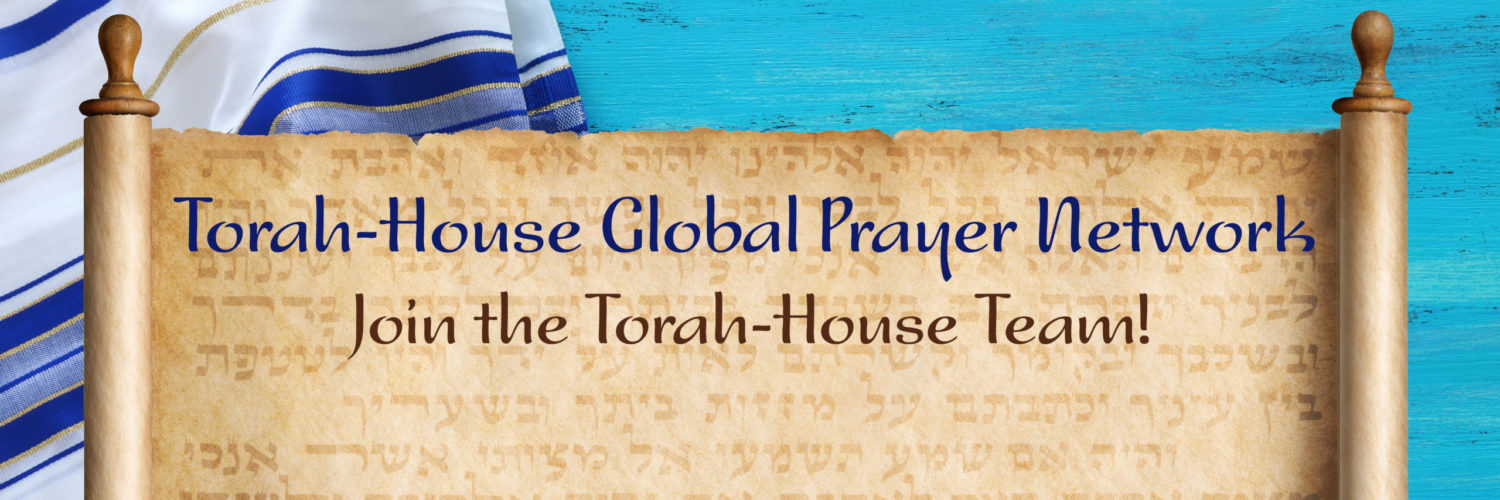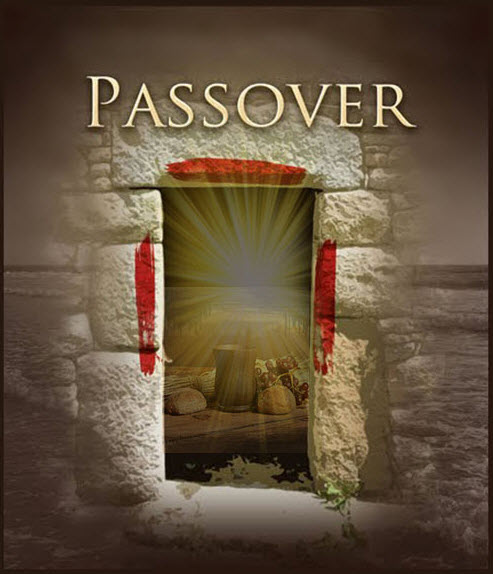by Hildegard Schneider
We all know the wonderful story of the liberation of the people of Israel from Egyptian slavery, which we read again every year at Passover. Today we want to look at deeply hidden secrets of the Passover story.
And the Lord spake unto Moses and Aaron in the land of Egypt saying, This month shall be unto you the beginning of months: it shall be the first month of the year to you. Speak ye unto all the congregation of Israel, saying, In the tenth day of this month they shall take to them every man a lamb, according to the house of their fathers, a lamb for an house: And if the household be too little for the lamb, let him and his neighbour next unto his house take it according to the number of the souls; every man according to his eating shall make your count for the lamb.
Your lamb shall be without blemish, a male of the first year: ye shall take it out from the sheep, or from the goats: And ye shall keep it up until the fourteenth day of the same month: and the whole assembly of the congregation of Israel shall kill it in the evening. And they shall take of the blood, and strike it on the two side posts and on the upper door post of the houses, wherein they shall eat it.“ (Exodus 12:1-7, KJV)
Every father of a family was to slaughter a lamb for his family. And we know that the lamb, without fail, was a picture of Yeshua.
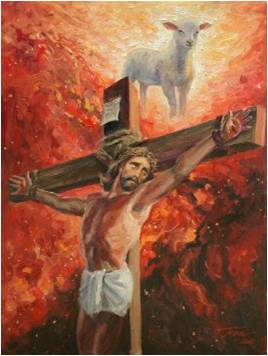
This messianic meaning is also underlined by the fact that the Hebrew text says that the Israelites put the blood on the doorposts, but YHWH considered the blood on the doorposts to be the Aleph Tav blood, that is, the blood of his Son.
„And the blood shall be to you for a token upon the houses where ye are: and when I see the Alef-Tav blood, I will pass over you, and the plague shall not be upon you to destroy you, when I smite the land of Egypt.“ Exodus 12:13, KJV
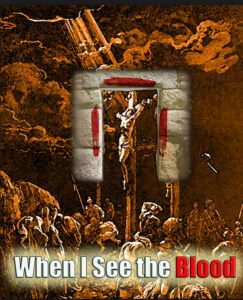
Yeshua said of himself that he was the Aleph and Tav:
I am Alpha and Omega, the beginning and the end, the first and the last.
Revelation 22:13.
YHWH could just as well have instructed only Moses to slaughter a lamb, and have this one lamb represent all the people. He could have asked only Moses to paint the blood of the lamb on the doorposts. YHWH could have considered the blood of that one lamb to be the Aleph Tav blood. We know that YHWH did not choose this path.
The fact was that EVERY father of the family had to sacrifice a lamb. Everyone had a sacrifice to make. And this was to be done, in spite of the fact that the sacrificed lamb had already made full atonement before the foundation of the world:
And all that dwell upon the earth shall worship him, whose names are not written in the book of life of the Lamb slain from the foundation of the world. Revelation 13:8
But YHWH demanded here the additional sacrifice of a lamb to be done by every father of the family. YHWH wanted everyone to bring a sacrifice. Why? There are two reasons.
First Reason
In dealing with his chosen people, Elohim did not invent a new rite or ceremony at each stage of his progressive revelation to them, but he took a rite with which the Middle Easterners were already familiar and gave it a new and deeper meaning in its new use and relations.
Long before the day of Passover was instituted, there was a Middle Eastern custom. Whenever a guest (or bride or groom) was to be received into the family, they were received into marriage by shedding blood on the door post and staining the door post itself with the blood of the covenant.
And now YHWH announced that he would visit Egypt on a certain night, and that those who wished to welcome him should prepare a threshold covenant or a crossing offering as proof of this welcome; for where a family did not have such a welcome ready for him, he must regard those household members as his enemies.
When Elohim announced this desire to the Hebrews for a welcome offering, he spoke of it as “a Passover to YHWH” (Ex 12:11) as if the Passover rite was a familiar rite that was now to be followed as a welcome to YHWH. A lamb was the chosen sacrifice for the greeting to YHWH. Each household or family was to take a lamb for this offering.
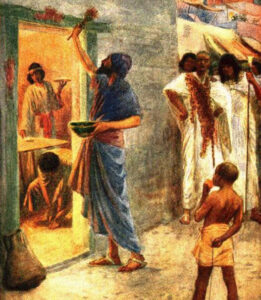
This greeting with blood signified protection by YHWH’s covenant when he came to Egypt to judge his enemies.
To achieve this goal, YHWH required the Hebrews to make the sacrifice of crossing the threshold:
‘For I will pass through the land of Egypt on that night, and will strike all the firstborn in the land of Egypt, both man and beast; and against all the gods of Egypt I will execute judgment: I am the LORD. ‘Now the blood shall be a sign for you on the houses where you are.And when I see the blood, I will pass over you; and the plague shall not be on you to destroy you when I strike the land of Egypt. Exodus 12:12-13
Obviously, the image used here is of a ruler accompanied by his executioner, a familiar figure in the ancient East. When he comes to a house marked by signs of welcome, the ruler will cross the threshold and enter the house as a guest or as a member of the family; but where no such preparation has been made for him, his executioner will enter in his mission of judgment.
The term “Passover” is commonly understood in the context of the Hebrew Exodus from Egypt to mean that YHWH passed by the houses whose doors were stained with blood without entering them. However, this meaning is not justified by the term itself or by the meaning of the original rite. YHWH did not just spare his people when he brought judgement on the Egyptians. He made a new covenant with them by crossing the blood-stained threshold to their homes, while his messenger of death entered the homes of YHWH’s enemies and claimed the firstborn as YHWH’s property.
In the Passover rite as followed by modern Jews, at a certain point in the celebration, the outer door is opened and an extra cup and chair are placed at the table in the hope that Elijah, the messenger of Elohim, will cross the threshold and enter the house as a welcome guest. All this points to the meaning of “crossing over” rather than “passing by”.
It seems clear that the Egyptian Passover rite was a rite of covenant-making at the threshold as ordered by Elohim and understood by the Israelites. The sacrifice took place at the threshold of the Hebrews’ homes, at the threshold of a new year and at the threshold of a new nationality. Then Israel began anew in all things.
It is time to realise that we are called by YHWH to enter into a covenant through the sacrifice of his Son Yeshua
To a covenant belong the covenant conditions, laid down in the Torah. Wherever we fail to keep Torah instructions, we are living in sin; that we may realize nor confessed.
Sin by definition is this:
Whoever committs sin transgresses also the law (the Torah): for sin is the transgression of the law (the Torah).1 John 3:4.
For example, if I do not keep Shabbat, I transgress the commandment of YHWH and thereby, I committ sin.
YHWH wanted everyone to bring a sacrifice. Why? Now let’s look at the second reason.
Second Reason
The Passover sacrifice brought together a huge amount of lamb sacrifices. If we assume, for example, that 600,000 men went out and yet not every family sacrificed a lamb. if we consider that often several men belonged to one family, then perhaps 500,000 lambs were sacrificed, or perhaps only 400,000.
The number of men can be somewhat circumscribed: Thus, Rabbi Gimpel has expressed in the Jerusalem Post that the indication of 603 550 men, in the following biblical passage from Exodus 38:26: “a beka per head, half a shekel, according to the shekel of the sanctuary, of everyone who went over to the mustered, from twenty years old and upward, of 603 550 ⟨man⟩” refers to men of conscript age. By the way, the area of Ukraine is given exactly with this figure: 603 550 km2. But back to our topic.
This tremendous amount of sacrifice released such great power in the spiritual realm. The iron grip of Pharaoh was broken and the Israelites were liberated. While the Egyptian firstborn sons died that night, a lamb died for every Israelite household. The lamb died in the place of the firstborn of the Israelite family. Their firstborns were spared, while the firstborn among the Egyptians died.
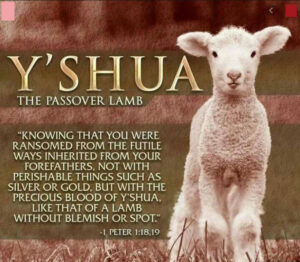
The word for sacrifice, in Hebrew, is olah. This occurs 289 times in Hebrew in the Bible. It comes from the associated root word ala. The first two letters ayin and lamed form the Hebrew word al, which means “yoch”.
The letter Ayin stands for eye, perception and insight. The letter lamed stands for teaching, learning and purpose or authority. One way to look at a yoch is: “a perception of authority or teaching insight.“

One source describes it as “experience of the staff“.
The Merriam-Webster dictionary describes yoke as: “a bar or frame attached to the heads or necks of two working animals (e.g. oxen) to enable them to pull a plough or heavy load.“
A yoke is used to attach an animal or human to an object that was called a load. If two or more animals were used, the yoke distributed the weight or force needed to move the load. The Paleo-hebrews drew the first letter of the alphabet as two oxen pulling a load.
Although YHWH could have ordered Moses to offer only one substitutionary lamb sacrifice for all of the people, YHWH required each father of the family to offer a lamb. And later YHWH gave the individual sacrificial regulations for the tabernacle and for the temple.
In other words, sacrifice is inseparably connected with YHWH.
Let us now take a closer look at this connection.
As you recall, the word olah for sacrifice contains the word al for yoch. Is it not the case that the yoch under which YHWH voluntarily bound himself, namely to sacrifice his son Yeshua before the foundation of the world, that he has now also placed on all the fathers of the family on this Passover night, so that they participate in his yoch of sacrifice? YHWH is putting the fathers of the family, who are the heads of their households, under a yoke of sacrifice.
I ask you to think about this train of thought. When we did teshuva, we were taught to walk in His cycles, that is, from Shabbat to Shabbat, to celebrate His feasts according to Exodus 23, to keep His dietary rules, but we were not taught about the value of sacrifice. During the time of the wilderness tabernacle and the first and second Temple periods, the sacrificial offerings were an integral part of daily life. They were brought to make a difference. Long before there were sacrificial protocols outlined in Leviticus, individuals had clarity about the power of sacrifices.
Even if we take the words of Yeshua, “Take my yoke upon you and learn from me” (Matthew 11:29), don’t we gain new insights into the Father when we follow the teachings of Yeshua?
We also find this idea of sacrifice in the instructions for the three feasts. Thus we read the following Passover instructions:
These are the feasts of the LORD; holy convocations which you shall proclaim at their appointed times. ‘On the fourteenth day of the first month at twilight is the LORD‘s Passover. ‘And on the fifteenth day of the same month is the Feast of Unleavened Bread to the LORD seven days you must eat unleavened bread. ‘On the first day you shall have a holy convocation; you shall do no customary work on it. ‘But you shall offer an offering made by fire to the LORD for seven days. The seventh day shall be a holy convocation; you shall do no customary work on it.’ ” Leviticus 23:4-8
Here again we are talking about the sacrifice of a lamb, which we do not literally sacrifice at the moment because there is no Temple. But we could sacrifice the value of the lamb or a lesser value, depending on our possibilities. After all, this is talking about an eternal order for the generations in all dwellings.
Regardless of the instructions of the sacrifices in the Tabernacle and in the Temple, we find so much evidence in YHWH’s word that people at that time had access to this side of YHWH, that his being was closely connected to the sacrifices.
Let’s take Job, for example:
“There was a man in the land of Uz, whose name was Job; and that man was perfect and upright, and one that feared God, and eschewed evil. And there were born unto him seven sons and three daughters. Job 1:1-2
“And his sons went and feasted in their houses, every one his day; and sent and called for their three sisters to eat and to drink with them.“ Job 1:4
Job was pious (tam, which means morally innocent, integrity, one who is morally and ethically pure), righteous (yasar = straightforward, just, righteous) and God-fearing. And this man, who was morally and ethically pure, straightforward and righteous, offered sacrifices to his Elohim. Why?
He wanted to sanctify the days of the banquets of his sons and daughters through the burnt offerings and to offer sacrifices for the potential sins of his sons and daughters. Why? In order to repent before YHWH so that they would not be condemned.
Do we simply dismiss this as Old Testament custom? As is claimed in mainstream Christianity, the Torah no longer applies to us.
Yet Yeshua said: „or verily I say unto you, Till heaven and earth pass, one jot or one tittle shall in no wise pass from the law, till all be fulfilled.“ (Mathew 5:18)
Since Yeshua and the Father are one, there are not two different teachings, but they and their teachings are one.
If we declare everything to be valid, don’t we need to consider this? Who makes a sacrifice for the rebellious behaviour of his children before YHWH? And it is said of Job that he did this at all times. And Job took the sacrifices out of his possession, about which the following is said:
„ His substance also was seven thousand sheep, and three thousand camels, and five hundred yoke of oxen, and five hundred she asses, and a very great household; so that this man was the greatest of all the men of the east.“ Job 1:3, KJV
And then another day came when Job wanted to sacrifice for the feasts of his children.
„And there was a day when his sons and his daughters were eating and drinking wine in their eldest brother’s house: And there came a messenger unto Job, and said, The oxen were plowing, and the asses feeding beside them: And the Sabeans fell upon them, and took them away; yea, they have slain the servants with the edge of the sword; and I only am escaped alone to tell thee.“ Job 1:13-15; KJV
How was it that Job suddenly could no longer bring animal sacrifices? At this point we have to insert the conversation between YHWH and HaSatan, in which YHWH had given the enemy permission to touch everything that belonged to Job, except himself. And what did HaSatan do? The very first thing he did was to touch Job’s herds of animals, thus taking from him his ability to sacrifice. So this time he could not bring sacrifices for his sons and daughters when they met. Job knew the power of sacrifice.
How do we present a sacrifice to YHVH today?
We know that one day, when the Third Temple is built that the sacrificial system will be reinstated and the Levitical Priests will have priestly duties in Temple to follow the protocols the sacrificial system (see Ezekiel 46 and 47).
Until we have a Third Temple, how do we present a sacrifice unto the LORD today?
Of course, we do not slaughter lambs today, but we can bring the value of a lamb or even several lambs or smaller amounts to a priest who is instructed about this kind of sacrifice and then prays for a specific intention connected with the sacrifice.
And since haSatan knows the value and power of sacrifice, the enemy among his followers uses these very sacrifices. The more his followers sacrifice, the stronger his power. For example, I have heard that owners of a very famous bread factory, for example, sacrificed 12 trucks of chickens to the sea god so that they could keep their leading position in the market. And we all know about the sacrifices offered to haSatan, up to human sacrifices. He did not create anything new with the sacrifices, but only imitates YHWH.
The more we study YHWH’s word with regard to the sacrifices, the more we realize that the sacrifices belonged to the believers. And the great example of this is YHWH Himself, who gave the greatest sacrifice, to offer His Son for us.
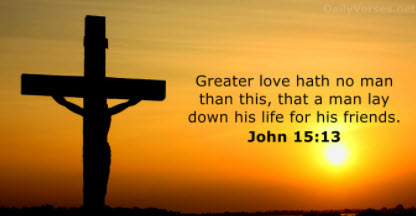
“Greater love has no one than this, than to lay down one’s life for his friends. John 15:13
Based on this offering, YHWH expects sacrifices from us as an expression of our love for Him. We honor him with it and He responds to us.
Now Paul says in Romans 12:1:
“I exhort you therefore, brethren, by the mercies of Elohim, to present your bodies a living sacrifice, holy, acceptable to Elohim, which is your reasonable worship.”
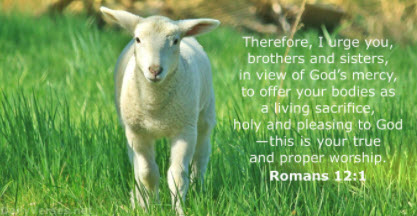
Our bodies, our flesh and blood, that is the space of our personality, the space we occupy as human beings. The space with which we act and walk, do and rule in the space of this world, and surely this includes the gift of tithing and offering?
The prophet Malachi 3:8 also comments on the gift of tithing and offering:
“May a man rob Elohim? Yes, you rob me! – But you say, “In what have we robbed you?” In tithes and in heave offerings.”
The heave offerings always consisted of material gifts.
But isn’t it said that obedience is better than sacrifice? For example, in 1 Samuel 15:22:
“But Samuel said, ‘Does YHWH have ⟨as much pleasure⟩ in burnt offerings and sacrifices as in obeying YHWH’s voice? Behold, obeying is better than sacrifice, heeding better than the fat of rams.”
Or Hosea 5:6:
“With their flocks and with their herds they will go to seek YHWH, and will not find him; He has withdrawn from them.”
These statements show that YHWH is not interested in our sacrifices unless we bring them to Him in the right attitude of heart. An offering, whether we bring it and how we bring it, reveals our heart attitude. YHWH does not want an empty shell. YHWH looks at the mindset behind our sacrifices. Our sacrifice is only valid in the context of relationship, recognition and closeness to God. Thus, the Hebrew word korban, meaning sacrifice, also means closeness from its root word karab.
So, may we bring our sacrifice unto YHVH with a right attitude of heart this Passover season!
Chag Sameach Passover!
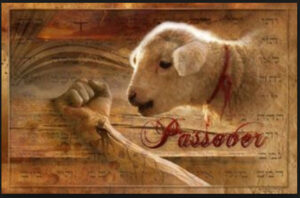
Prayer Targets
*Abba, dear heavenly Father, open our spiritual eyes to these Passover mysteries.
*Abba, dear heavenly Father, make us ready to go under the yoke of Yeshua, which is easy and light, and may we move in your sacrificial system.
*Abba, dear heavenly Father, grant that we make sacrifices of love to you and thus come to know you better.
*Abba, dear heavenly Father, give us the will, the obedience and the heart to lay down our lives in sacrifice to others…for this puts your love on display to the world around us.
*Abba, dear Father, make us be a WILLING living and loving sacrifice upon your altar. May we not shrink away or crawl off the altar when it becomes uncomfortable, stretching and painful.
